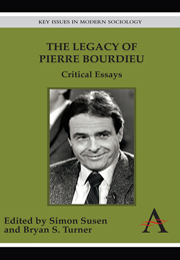Book contents
- Frontmatter
- Contents
- List of Contributors
- Introduction: Preliminary Reflections on the Legacy of Pierre Bourdieu
- 1 Between Structuralism and Theory of Practice: The Cultural Sociology of Pierre Bourdieu
- 2 Pierre Bourdieu: Unorthodox Marxist?
- 3 From Marx to Bourdieu: The Limits of the Structuralism of Practice
- 4 Durkheim and Bourdieu: The Common Plinth and its Cracks
- 5 With Weber Against Weber: In Conversation With Pierre Bourdieu
- 6 Bourdieu and Nietzsche: Taste as a Struggle
- 7 Elias and Bourdieu
- 8 Bourdieu and Adorno on the Transformation of Culture in Modern Society: Towards a Critical Theory of Cultural Production
- 9 The Grammar of an Ambivalence: On the Legacy of Pierre Bourdieu in the Critical Theory of Axel Honneth
- 10 Pierre Bourdieu and the Sociology of Religion
- 11 Bourdieu's Sociological Fiction: A Phenomenological Reading of Habitus
- 12 Overcoming Semiotic Structuralism: Language and Habitus in Bourdieu
- 13 Social Theory and Politics: Aron, Bourdieu and Passeron, and the Events of May 1968
- 14 Intellectual Critique and the Public Sphere: Between the Corporatism of the Universal and the Realpolitik of Reason
- 15 Practice as Temporalisation: Bourdieu and Economic Crisis
- Afterword: Concluding Reflections on the Legacy of Pierre Bourdieu
- Index of Names
- Index of Subjects
- Plate section
12 - Overcoming Semiotic Structuralism: Language and Habitus in Bourdieu
Published online by Cambridge University Press: 05 March 2012
- Frontmatter
- Contents
- List of Contributors
- Introduction: Preliminary Reflections on the Legacy of Pierre Bourdieu
- 1 Between Structuralism and Theory of Practice: The Cultural Sociology of Pierre Bourdieu
- 2 Pierre Bourdieu: Unorthodox Marxist?
- 3 From Marx to Bourdieu: The Limits of the Structuralism of Practice
- 4 Durkheim and Bourdieu: The Common Plinth and its Cracks
- 5 With Weber Against Weber: In Conversation With Pierre Bourdieu
- 6 Bourdieu and Nietzsche: Taste as a Struggle
- 7 Elias and Bourdieu
- 8 Bourdieu and Adorno on the Transformation of Culture in Modern Society: Towards a Critical Theory of Cultural Production
- 9 The Grammar of an Ambivalence: On the Legacy of Pierre Bourdieu in the Critical Theory of Axel Honneth
- 10 Pierre Bourdieu and the Sociology of Religion
- 11 Bourdieu's Sociological Fiction: A Phenomenological Reading of Habitus
- 12 Overcoming Semiotic Structuralism: Language and Habitus in Bourdieu
- 13 Social Theory and Politics: Aron, Bourdieu and Passeron, and the Events of May 1968
- 14 Intellectual Critique and the Public Sphere: Between the Corporatism of the Universal and the Realpolitik of Reason
- 15 Practice as Temporalisation: Bourdieu and Economic Crisis
- Afterword: Concluding Reflections on the Legacy of Pierre Bourdieu
- Index of Names
- Index of Subjects
- Plate section
Summary
Pierre Bourdieu's conception of habitus marks a theoretical step which no adequate understanding of social reality can ignore. By introducing habitus, Bourdieu is able both to integrate and to transcend major insights of the linguistic turn in philosophy, most prominently the idea that conscious intentional understanding necessarily relies on a host of implicit, practical, and holistic background assumptions which constitute meaning while being themselves unrepresented (Searle, 1989). The concept of habitus incorporates this idea since it shows that individual agency and its self-understanding are constituted by relying on an acquired social sense, the cognitive habitus, which defines how an agent understands, acts, and perceives itself and its environment. At the same time, it transcends the philosophical thematisation of a constitutive yet implicit background because it makes this hidden continent of pre-understanding susceptible to empirical-analytic social science.
This major step is hailed in traditional social theory as well as by Bourdieu himself as the mediation of agency and structure. It consists in reconstructing how specific social environments (that is, the structural conditions of agency) relate to and shape the internal sense of intentional agency (that is, the individual first-person dimension of agency) (Bourdieu, 1977 [1972]; 1990 [1980]). Habitus connects the two via a realm of pre-structured, schematised modes of understanding that define the specific cognitive accomplishments that any particular agent is capable of performing.
- Type
- Chapter
- Information
- The Legacy of Pierre BourdieuCritical Essays, pp. 271 - 300Publisher: Anthem PressPrint publication year: 2011
- 8
- Cited by



